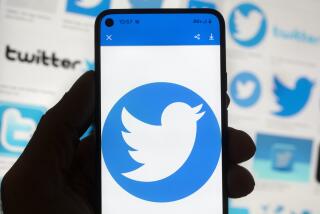Apple to open up the iPhone
- Share via
SAN FRANCISCO — Apple Inc. Chief Executive Steve Jobs said Wednesday that the company would let outside developers create software for its iPhone and iPod Touch gadgets, showing the company’s increasing willingness to change course in response to customer demands or changing market conditions.
In a letter posted on Apple’s website, Jobs said the company was trying to find a way to open up the iPhone to useful programs but not to viruses and other malicious software. He said the company planned to release developer tools in February to let programmers create iPhone software.
“We think a few months of patience now will be rewarded by many years of great third-party applications running on safe and reliable iPhones,” Jobs wrote.
Apple touts the iPhone as a mini-computer combined with a cellphone, but since its June release users have complained that they weren’t allowed to install software as they could on a computer.
Until Wednesday, Jobs had dodged questions about whether he planned to change that policy.
“Let me just say it: We want native third-party applications on the iPhone,” he wrote. “We are excited about creating a vibrant third-party developer community around the iPhone and enabling hundreds of new applications for our users.”
Some software developers didn’t wait for Jobs, starting almost immediately to make programs such as Sudoku games and voice mail management tools that users found online and added to their iPhones. Others created programs to unhook the iPhone from its wireless carrier, AT&T; Inc.
But Apple fought back. Last month the Cupertino, Calif., company issued a software update for the iPhone that knocked out many programs, antagonizing developers and iPhone users. It also damaged some phones that had been disconnected from AT&T.;
Wall Street has paid close attention to the power struggle among Apple, its users and software developers, Pacific Crest Securities analyst Andy Hargreaves said.
“If the device is locked down, there is only so much Apple can do with it,” Hargreaves said. “You could look out in two years and say this is going to stagnate. Now you can look out and say, yes, this device will achieve more than it already has.”
Apple’s shares closed up $3.17, or nearly 2%, to $172.75, a record high.
Once famous as the computer industry’s underdog, Apple is still adjusting to being a leader in entertainment and consumer electronics. It now sets the pace, and policies, in major new markets such as digital music, media players and mobile phones.
“It’s way outside Apple’s DNA to be a market leader,” said Steve Chazin, a former marketing executive for Apple and now an Internet executive. “They still have the culture of wanting to be the good guy. But they have to make decisions for those who don’t want to tinker with their computer.
“It’s hard for them to know what is right,” he added, “and the experience is humbling.”
One sign of stress: The company delayed shipping its updated computer operating system while engineering talent was redirected to the iPhone. The update, Leopard, is due next week.
Another: Apple cut the price of the iPhone by $200, or 33%, two months after it launched. When iPhone owners loudly complained that they had overpaid, Apple tossed them a store credit of $100.
And perhaps another: On Tuesday, Apple announced it was slashing the price of the music it sells without copyright restrictions, to 99 cents from $1.29. The move brought its price for such offerings in line with new competitor Amazon.com Inc.
Jobs did not say whether the company had originally intended to open up the iPhone to developers or whether it was announcing its intention to do so in response to interest.
“The iPod was management training wheels for the iPhone,” said Paul Saffo, a Silicon Valley technology forecaster. “They are taking the classic model: The consumer is always right.”






